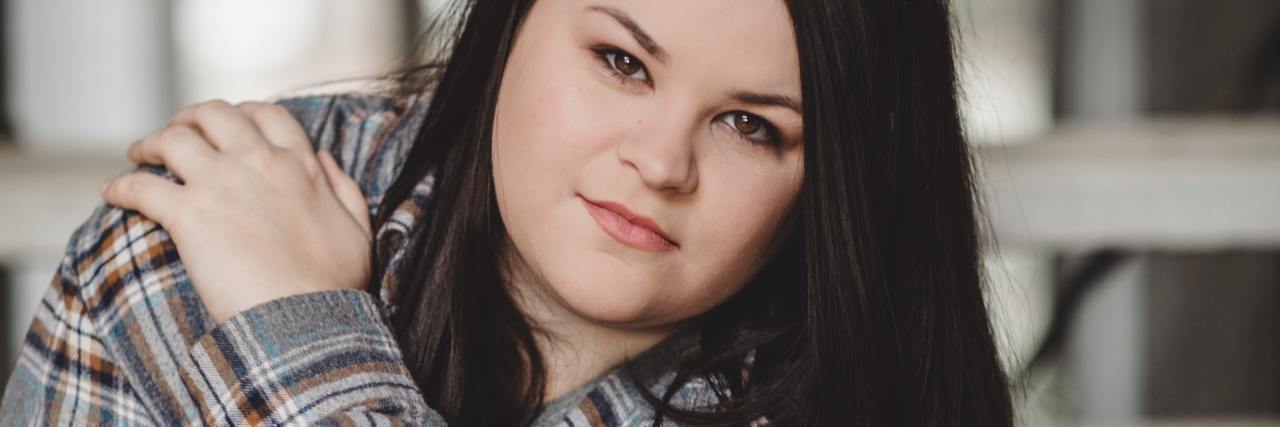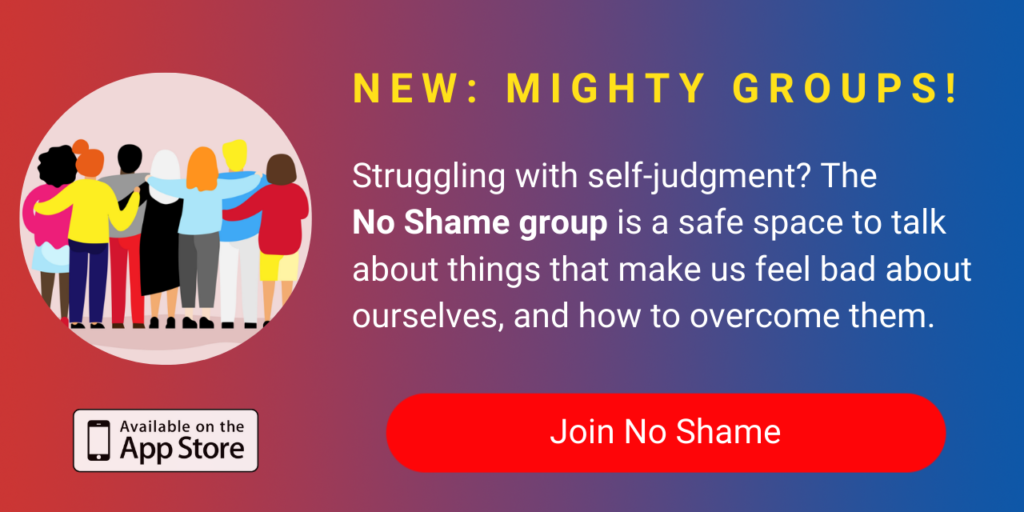The Shame of Taking Care of My Physical Health With My Eating Disorder
Editor's Note
If you live with an eating disorder, the following post could be potentially triggering. You can contact the Crisis Text Line by texting “NEDA” to 741741.
I have a history of anorexia nervosa, which most people in my life can’t imagine. Nobody expects the girl who medically qualifies as “obese” to have an eating disorder that involves starving herself. What people don’t understand is that the inactivity due to my physical disability and some hormone imbalances, along with a few other issues, are actually what caused my weight gain. At one time, I was starving myself and still gaining a little weight every day. Yet I was judged; I couldn’t possibly be struggling with anorexia when I’m obese.
This stigma is hard enough to live with, but now I’m dealing with a new type of stigma. Over the years, my relationship with food has become more complicated. I now struggle with two extremes; the need to starve myself is still there, but so is the need to binge. With a few improvements in those health problems that were causing weight gain, the main reason for my weight being heavier than I feel comfortable with now is due to binging.
I still have to live with anorexia; it is, after all, a mental health problem. That voice is still in my head, telling me to stop eating, as if I could somehow control my life by not eating. And then there’s the comfort eating, which goes to a whole other extreme and hits without warning, along with whatever emotionally unstable episode I happen to be feeling. It’s really hard to live with.
Mixed in with all of this are my other underlying mental health problems. I think the fact I have dissociative identity disorder (DID) probably plays into it a bit; some of my personalities want to starve themselves, while others want to binge. Do any of my personalities have a healthy relationship with food?
As if my mental health wasn’t already chaotic enough, I also live with some life-altering physical disabilities. Most notably, I fight every day against myalgic encephalomyelitis/chronic fatigue syndrome (ME/CFS) and fibromyalgia. If I were at a healthy weight for me, I would still be fighting intense levels of pain and fatigue; that is the nature of this illness. To those people who think that if I just lost weight and reached my personal “healthy” weight then my fibromyalgia and CFS would disappear: I was a healthy weight when I got sick, and I’ve been a healthy weight many times since having these illnesses. My obesity does not cause these illnesses, but it brings on health concerns of its own.
Additionally, there is some degree of increased pain due to my weight. Don’t get me wrong, certain pains that I experience remain unchanged no matter my size, but some of the aches I get when I move are worse.
I need to lose weight for my physical health, but when diet is central to both weight loss and eating disorders, I face a number of uphill battles. I spent a long time looking at different diets, trying to find one that’s right for me. I don’t want too much calorie counting, because I don’t want to obsess and feel guilty every time I eat. I don’t want too much of a ridged timing plan; going hungry for hours because I’m waiting for my next meal isn’t going to be supportive to my mental state.
I found a plan that works best for me. It has been revolutionary for me: switching out cakes, biscuits and crisps for fruit and veg. In fact, one of the tips for those of us struggling with binging is that instead of limiting our food intake, we should just change what food we are eating to “healing foods” that help us and make us feel good.
Of course, losing weight doesn’t fix my mental health problems. My mental health problems pose regular challenges to my weight loss. Yet, there is one stigma that I hadn’t quite anticipated; the stigma of losing weight when you have an eating disorder.
I understand that people are trying to be helpful and supportive, but I think they need to understand what their assumptions can sound like and the negative impact they have. When people who know I have an eating disorder hear that I am trying to lose weight, they immediately make comments about how it isn’t healthy for me to obsess over calorie counting, or how I look, or focusing on the negatives. Or I am informed, so regularly it feels more like a rebuke, that losing weight will not fix my eating disorder; as if that were the reason for my slimming.
I am trying to lose weight because the risks to my health are numerous. The weight added to my pain and fatigue, which in turn meant I needed my wheelchair more and more. I used to love to run and dance; I couldn’t do those things anymore. I was in and out of hospital with several departments investigating distressing symptoms, many of which were symptomatic of more severe health conditions linked to obesity.
Having an eating disorder does not erase the physical illnesses and challenges I have with being obese. It is harder for me to lose weight because of my eating disorder. I’m already fighting an uphill battle; I don’t need stigma too.
I don’t have the option to “deal with my mental health first” because my physical health became so debilitating, I had trouble getting out of the house to access services. And after years of therapy, I am still struggling with my eating disorder; from what I understand, it is something I will always struggle with to some degree. My best way forward is to try and combat both at the same time; the holistic approach.
Now, I spend a lot of time talking about food in a positive light. Most of what I eat doesn’t need to be weighed, measured or tracked. I am able to eat as much as I want or need to, without feeling guilty. In fact, I rarely ever have episodes of starving myself anymore.
Binging is a little trickier. When my mental health gets bad, I still desperately want everything that has sugar in it. However, I now have fewer binging episodes (or less junk, more healing foods) than I did before. But this problem isn’t going away, and the mental health issues are still there; they need to be addressed, and slimming in itself cannot deal with those.
When people make these assumptions and accusations that I am focusing on the negatives, comparing myself to others or obsessing over counting calories, I feel like I’m being shamed. I feel shamed in a way that I have never felt at my weight-loss group. In fact, if I felt shamed by going to that group then I wouldn’t go. I go to that group because being there, even when I’ve had a few weeks (or even months) of struggling and gaining weight, the shame starts to fall away.
The shame falls away when the person weighing me doesn’t react to my gain in a week. The shame falls away when we excitedly swap recipes or talk about the latest fruits or vegetable to come into season. The shame falls away when I’m chatting with other members about our lives, hobbies and interests because we are so much more than a number on the scales.
The shame comes back when people judge me and make assumptions because I have an eating disorder and I am trying to lose weight. The shame comes back when people try to insist I don’t need to lose weight because I look great, as if my looks are more important than my health. The shame comes back when people try to make my weight-loss journey all about my eating disorder; I am not defined by my weight, but it’s like they’re trying to define me by my eating disorder.
I am so much more than a number on the scales. I am so much more than an eating disorder.
Yes, there are complications to slimming with an eating disorder. Yes, there are precautions that need to be taken; regular self-check-ins with one’s own mental health. But having an eating disorder doesn’t eliminate or replace physical health problems that are associated with obesity.
Concern is appreciated; judgment is not.
I have an eating disorder and I need to lose weight. But all that really means is that I need to be doing things to address my eating disorder, while also doing things to address my weight in a healthy way. Please don’t judge people who are slimming for their physical health while also having to battle an eating disorder.
Photo by Caleb Lucas on Unsplash


